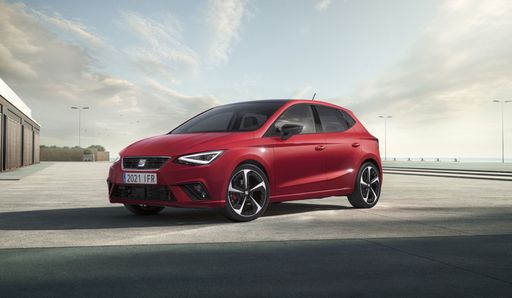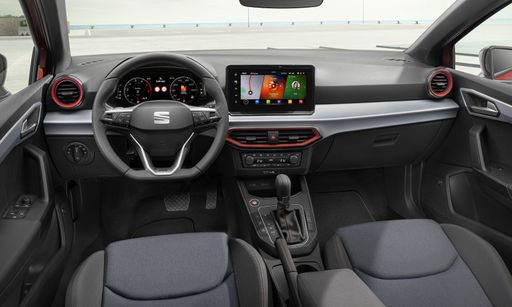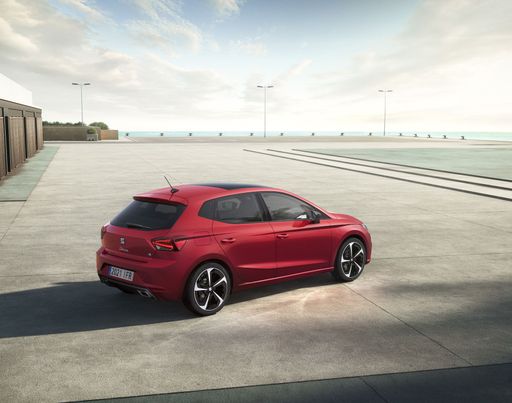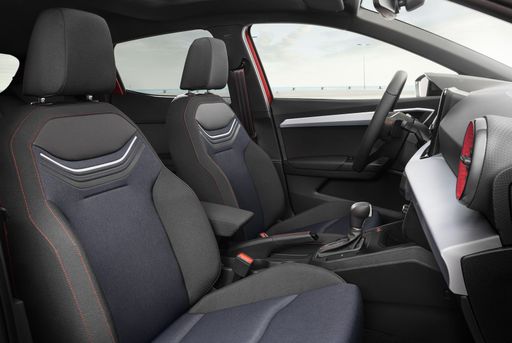SEAT Ibiza vs Toyota Yaris - Differences and prices compared
Compare performance (150 HP vs 280 HP), boot space and price (16800 £ vs 21900 £ ) at a glance. Find out which car is the better choice for you – SEAT Ibiza or Toyota Yaris?
Costs and Efficiency:
Price and efficiency are often the first things buyers look at. Here it becomes clear which model has the long-term edge – whether at the pump, the plug, or in purchase price.
SEAT Ibiza has a distinct advantage in terms of price – it starts at 16800 £ , while the Toyota Yaris costs 21900 £ . That’s a price difference of around 5015 £.
Fuel consumption also shows a difference: Toyota Yaris manages with 3.80 L and is therefore clearly perceptible more efficient than the SEAT Ibiza with 5 L. The difference is about 1.20 L per 100 km.
Engine and Performance:
Power, torque and acceleration are the classic benchmarks for car enthusiasts – and here, some clear differences start to show.
When it comes to engine power, the Toyota Yaris has a decisively edge – offering 280 HP compared to 150 HP. That’s roughly 130 HP more horsepower.
In acceleration from 0 to 100 km/h, the Toyota Yaris is decisively quicker – completing the sprint in 5.50 s, while the SEAT Ibiza takes 8.10 s. That’s about 2.60 s faster.
There’s also a difference in torque: Toyota Yaris pulls noticeable stronger with 390 Nm compared to 250 Nm. That’s about 140 Nm difference.
Space and Everyday Use:
Whether family car or daily driver – which one offers more room, flexibility and comfort?
Both vehicles offer seating for 5 people.
In curb weight, Toyota Yaris is hardly perceptible lighter – 1090 kg compared to 1111 kg. The difference is around 21 kg.
In terms of boot space, the SEAT Ibiza offers to a small extent more room – 355 L compared to 286 L. That’s a difference of about 69 L.
When it comes to payload, Toyota Yaris slight takes the win – 525 kg compared to 522 kg. That’s a difference of about 3 kg.
Who wins the race?
The Toyota Yaris proves to be dominates this comparison and therefore becomes our DriveDuel Champion!
Toyota Yaris is the better all-rounder in this comparison.

Toyota Yaris
Costs and Consumption
View detailed analysis
Engine and Performance
View detailed analysis
Dimensions and Body
View detailed analysis
SEAT Ibiza
The SEAT Ibiza is a cheeky, well-priced hatchback that blends sharp styling with a grown-up driving character, making it a smart choice for city commuters who still want a bit of fun. Inside it's practical and neatly finished, with sensible kit and easygoing manners that make everyday life less fussy — a car that doesn't try too hard but gets the job done with a smile.
details




Toyota Yaris
The Toyota Yaris is a sprightly city hatch that packs clever packaging, surprising comfort and fuel-sipping manners into a neat, easy-to-park package. It rewards sensible buyers with low running costs, friendly ergonomics and a forgiving drive, delivered with Japanese reliability and just enough personality to make errands feel a little less ordinary.
details

Costs and Consumption |
|
|---|---|
|
Price
16800 - 28800 £
|
Price
21900 - 46700 £
|
|
Consumption L/100km
5 - 5.7 L
|
Consumption L/100km
3.8 - 9.5 L
|
|
Consumption kWh/100km
-
|
Consumption kWh/100km
-
|
|
Electric Range
-
|
Electric Range
-
|
|
Battery Capacity
-
|
Battery Capacity
-
|
|
co2
114 - 128 g/km
|
co2
87 - 215 g/km
|
|
Fuel tank capacity
-
|
Fuel tank capacity
36 - 50 L
|
Dimensions and Body |
|
|---|---|
|
Body Type
Hatchback
|
Body Type
Hatchback
|
|
Seats
5
|
Seats
4 - 5
|
|
Doors
-
|
Doors
3 - 5
|
|
Curb weight
1111 - 1231 kg
|
Curb weight
1090 - 1356 kg
|
|
Trunk capacity
355 L
|
Trunk capacity
141 - 286 L
|
|
Length
-
|
Length
3940 - 3995 mm
|
|
Width
1780 mm
|
Width
1745 - 1805 mm
|
|
Height
-
|
Height
1455 - 1500 mm
|
|
Max trunk capacity
-
|
Max trunk capacity
935 L
|
|
Payload
489 - 522 kg
|
Payload
289 - 525 kg
|
Engine and Performance |
|
|---|---|
|
Engine Type
Petrol
|
Engine Type
Full Hybrid, Petrol
|
|
Transmission
Manuel, Automatic
|
Transmission
Automatic, Manuel
|
|
Transmission Detail
Manual Gearbox, Dual-Clutch Automatic
|
Transmission Detail
CVT, Manual Gearbox, Automatic Gearbox
|
|
Drive Type
Front-Wheel Drive
|
Drive Type
Front-Wheel Drive, All-Wheel Drive
|
|
Power HP
80 - 150 HP
|
Power HP
116 - 280 HP
|
|
Acceleration 0-100km/h
8.1 - 15.3 s
|
Acceleration 0-100km/h
5.5 - 9.7 s
|
|
Max Speed
-
|
Max Speed
175 - 230 km/h
|
|
Torque
95 - 250 Nm
|
Torque
390 Nm
|
|
Number of Cylinders
3 - 4
|
Number of Cylinders
3
|
|
Power kW
59 - 110 kW
|
Power kW
85 - 206 kW
|
|
Engine capacity
999 - 1498 cm3
|
Engine capacity
1490 - 1618 cm3
|
General |
|
|---|---|
|
Model Year
2025
|
Model Year
2024 - 2025
|
|
CO2 Efficiency Class
D, C
|
CO2 Efficiency Class
B, G
|
|
Brand
SEAT
|
Brand
Toyota
|
Is the SEAT Ibiza offered with different drivetrains?
Available configurations include Front-Wheel Drive.




